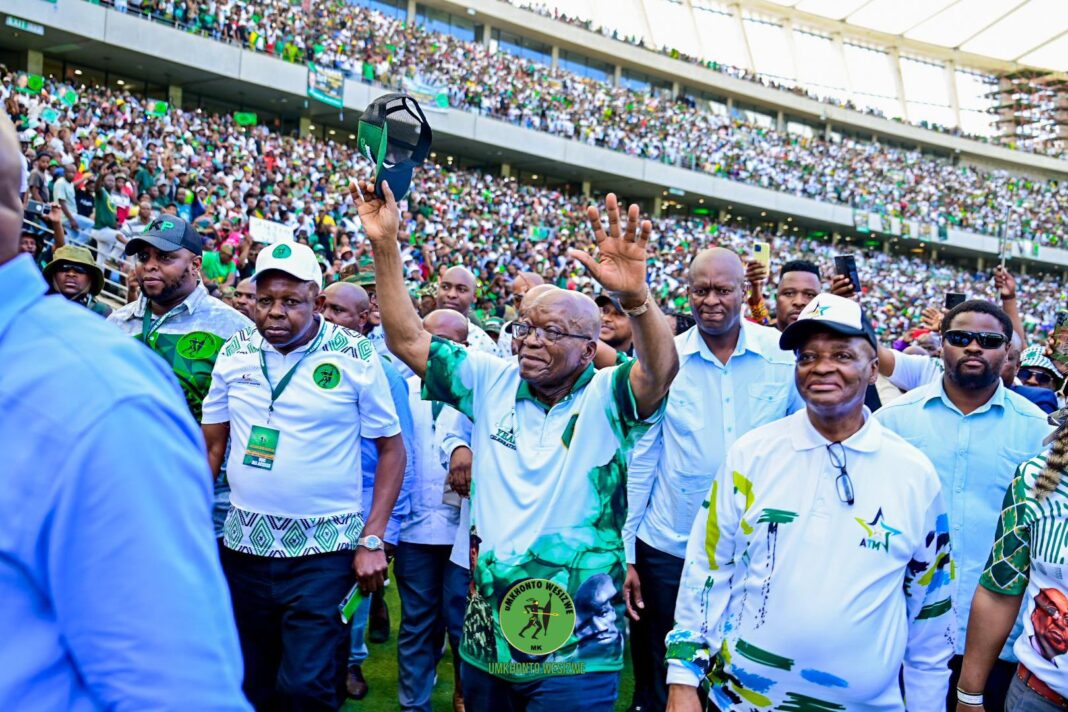By Johnathan Paoli
Umkhonto weSizwe (MK) party leader Jacob Zuma has urged black South Africans and progressive allies to unite and push for radical transformation, citing the failures of the past three decades.
Speaking at the party’s first-anniversary celebration at Moses Mabhida Stadium on Sunday, Zuma criticised the current government for straying from its revolutionary roots and perpetuating the economic and social inequalities inherited from apartheid.
“We have not realized the full vision of our liberation struggle,” Zuma said.
He called for a shift toward bold and revolutionary solutions, including economic policies that prioritize the empowerment of Black South Africans.
As the MK party marks its anniversary, Zuma’s call for radical transformation signals the party’s intention to position itself as a leading voice in South Africa’s political landscape.
“All the aspirations of our people will never be realised for as long as we continue to allow ourselves to be divided by the enemies of our freedom. The colonial and apartheid forces have used the same tactic of “divide and rule” to defeat us. MK will leave no stone unturned in the fight for the unity of the oppressed and exploited masses in South Africa and the continent of Africa,” Zuma said.
In a charged atmosphere, the MK party commemorated a year since its formation, emerging as a political force championing the rights of South Africa’s marginalized majority.
Zuma lambasted the ANC and its alliance with opposition parties, labeling their policies as neoliberal and detrimental to the majority.
He accused the government of perpetuating the status quo through austerity measures and alliances with historically oppressive forces.
“Never again shall we be fooled by the racists and their Black puppets. We will unite Black people and genuinely progressive forces, even if they are kicking and screaming. There is no alternative. Our total liberation depends on it,” he said.
Zuma reserved harsh criticism for President Cyril Ramaphosa’s administration, accusing it of neglecting the African majority through failed economic policies and electoral interference.
He painted a grim picture of the nation’s economic state, marked by soaring unemployment, rising inequality, and widespread poverty.
“Under the failed austerity measures of Cyril Ramaphosa, the cost of living has become unbearable. Electricity and water prices are unaffordable. Fuel prices are high, and food has become a luxury for many of our people,” Zuma said.
He also took aim at South Africa’s liberal constitution, which he argued protects the interests of the former oppressors.
Calling for its overhaul, Zuma said that liberation cannot be achieved via a liberal constitution that protects the property rights of land thieves and not those of the dispossessed masses.
At the heart of Zuma’s address was the issue of land redistribution.
He described landlessness as the root of economic disempowerment for Black South Africans, emphasising the need to reclaim the wealth and dignity lost to colonial and apartheid-era land theft.
“Today, landlessness renders us free slaves, begging our white masters for crumbs. We can only participate in the economy through selling our labour since access to credit and capital is tied to land ownership,” Zuma said.
He called for bold leadership to address the economic disparities entrenched by the past.
Zuma presented the MK Party as a beacon of hope for South Africans seeking radical change, emphasising the party’s dedication to mobilizing the masses and championing economic justice.
The party’s objectives include reclaiming natural resources for the benefit of all citizens, creating full employment, and decolonizing South Africa’s knowledge systems and legal frameworks.
“Our organization’s Constitution sets clear aims to unite all Black and progressive forces in South Africa to fight for total freedom,” Zuma said.
Among the key policy proposals included state-led industrialisation to expand the economy; and free, quality, and decolonised education from elementary to postgraduate levels.
Additionally, he called for strengthening traditional leadership roles and incorporating them into South Africa’s democratic framework, while combating crime and ensuring worker rights through unionization and living wages.
Zuma acknowledged the challenges facing the young MK Party, including internal factionalism and external attacks from the media, judiciary, and political adversaries; and urged party members to remain disciplined and united in their mission.
“We must address these issues decisively, with a firm hand and an unwavering focus on the greater good. No amount of external pressure can derail us,” Zuma said.
He stressed that one of the biggest external challenges were the alliance between the ANC of Ramaphosa and the Democratic Alliance which he described as betraying the aspirations of the many for the benefit of the elite few.
“This coalition with the racist DA and Freedom Front Plus represents a pact with forces that have historically opposed economic justice, land reform, and the empowerment of black South Africans. It is a betrayal of the struggle for liberation. It is a sellout of the vision of our heroes who sacrificed their lives to dismantle the colonial-apartheid system,” he said.
Zuma concluded his address with a rallying call for collective action, urging South Africans to join the MK Party in its fight for liberation.
He appealed to communities across the nation to organize and take part in a “new people’s war” through the ballot
“The time for liberation is now! Let us rise together to build a South Africa that fulfills the promise of true liberation,” Zuma said.
As MK enters its second year, the party leadership announced its intention to position itself as a rising force in South Africa’s political landscape, determined to reshape the nation’s future.
INSIDE POLITICS

